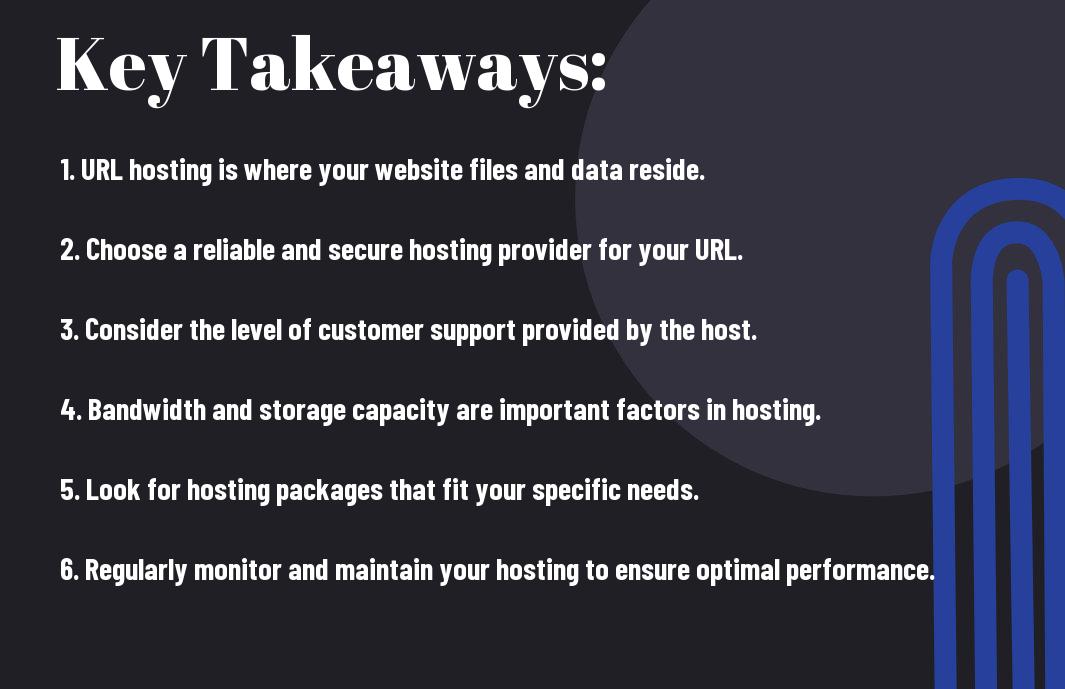Experienced in the world of web development and online business, you understand that URL hosting is a crucial aspect of your online presence. Whether you are an individual blogger or a company owner, having a reliable and secure web hosting service is essential for the success of your website. In this blog post, we will explore the important details you need to know about URL hosting, including the different types of hosting, the potential risks, and the benefits of choosing the right hosting provider. If you want to dig deeper into the world of web hosting, check out Everything You Need To Know About Web Hosting from Codecademy.
Understanding URL Hosting
Before delving into the complexities of URL hosting, it’s important to have a clear understanding of what it entails. URL hosting is a service that allows individuals and organizations to make their website accessible via the World Wide Web. This service is provided by hosting companies that allocate space on a web server for the storage of the website’s files.
Definition of URL Hosting
URL hosting involves the provision of storage space and access to websites on the internet. When you sign up for URL hosting, you are essentially renting space on a server where your website’s files and data will be stored. This server is connected to the internet, allowing users to access your website by entering your domain name in a web browser.
How URL Hosting Works
When you upload your website’s files to the server provided by the hosting company, these files are stored and made available to be accessed by internet users. When someone enters your domain name in their web browser, the browser sends a request to the server hosting your website, and the server responds by delivering the requested files, allowing the website to be displayed on the user’s device.
Choosing a URL Hosting Provider
Some of the first steps to take when setting up a website involve securing a reliable hosting provider. If you’re not sure what web hosting is, you can read more about it here. When it comes to choosing a hosting provider, there are several factors to consider.
Factors to Consider
When choosing a hosting provider, there are several important factors to keep in mind. First, you’ll want to consider the cost of the hosting service. While price is important, you’ll also want to look at the reliability and uptime of the provider, as well as the level of customer support that is available. Storage and bandwidth are also crucial considerations, as is the ease of use of the provider’s control panel. Finally, you’ll want to look at the security features offered by the provider. These are all important in ensuring that your website runs smoothly and securely. When evaluating different providers, it’s important to carefully weigh these factors and choose the one that best fits your needs.
- Cost: Compare the cost of different hosting providers
- Reliability and Uptime: Ensure that the provider offers a high level of uptime and reliability
- Customer Support: Look for a provider that offers responsive and helpful customer support
- Storage and Bandwidth: Consider your website’s storage and bandwidth needs
- Ease of Use: Look for a provider with an easy-to-use control panel
- Security Features: Ensure that the provider offers robust security features
Though cost is an important factor, it’s crucial to also prioritize reliability, support, and security when choosing a hosting provider.
Comparing Popular Hosting Services
When it comes to choosing a hosting provider, there are several popular services to consider. Here is a comparison of some of the most well-known hosting providers:
| Hosting Service | Key Features |
| HostGator | Reliable service, excellent customer support |
| Bluehost | Good uptime, easy-to-use interface |
| SiteGround | Top-notch security features, excellent performance |
| GoDaddy | User-friendly, great for beginners |
When comparing hosting services, it’s important to look at the key features offered by each provider to determine which one best aligns with your website’s needs.
Setting Up Your URL Hosting
Unlike free website hosting services, setting up your own URL hosting requires careful consideration and planning. You will need to choose a reliable hosting provider, register a domain name, and configure your hosting settings to ensure optimal performance for your website. Here are the key steps and considerations for setting up your URL hosting.
Domain Registration and Hosting Setup
When setting up your URL hosting, the first step is to register a domain name that represents your brand or website. Once you have chosen a domain name, you will need to select a hosting provider and set up your hosting account. This involves choosing a hosting plan that suits your website’s needs, such as shared hosting or dedicated hosting.
Tips for Successful Hosting Configuration
When configuring your hosting settings, there are several important factors to consider to ensure the success of your website. First, it is crucial to optimize your domain name system (DNS) settings to point to your hosting provider’s servers. Additionally, you should secure your hosting account by setting up SSL certificates to encrypt data transmission and protect sensitive information. It is also important to regularly backup your website’s files and data to prevent data loss in case of a server failure. Assume that regular maintenance of your hosting configuration is essential to keep your website running smoothly.
Advanced URL Hosting Features
Keep in mind that when choosing a URL hosting service, there are several advanced features you should consider to ensure that your website runs smoothly and securely. Here are some key features to look out for:
- Reliability and uptime guarantee are crucial for the smooth running of your website. It’s advisable to choose a hosting provider with a solid track record for uptime.
- Scalability and flexibility are important as your website grows. You need a hosting provider that can accommodate increased traffic and content without affecting performance.
- Customization options, including the ability to install and configure software, access to server logs, and a range of programming languages and databases.
- 24/7 customer support is essential for addressing any issues that may arise quickly and efficiently.
- Advanced security features such as DDoS protection, firewall, and malware detection are necessary to keep your website safe from cyber threats.
For a more in-depth understanding of advanced web hosting features, you can read this article about ‘5 Things You Need to Know About Web Hosting Before You Sign Up for an Account’.
| Features | Description |
| Reliability and Uptime Guarantee | Ensures your website is consistently available to users without downtime. |
| Scalability and Flexibility | Ability to accommodate increased traffic and content without affecting performance. |
| Customization Options | Allows for software installation and configuration, access to server logs, and supports various programming languages and databases. |
| 24/7 Customer Support | Provides round-the-clock assistance to address any issues that may arise. |
| Advanced Security Features | Offers protection against DDoS attacks, firewall, and malware detection. |
Security and SSL Certificates
When it comes to advanced URL hosting features, one of the most crucial considerations is security. You need to ensure that your hosting provider offers robust security measures to protect your website from cyber threats. This includes implementing SSL certificates to encrypt data transmitted between the user’s browser and your website, thus safeguarding sensitive information and providing a secure browsing experience for your visitors.
Backup and Recovery Options
Another vital aspect of advanced URL hosting features is having reliable backup and recovery options in place. In the event of data loss or website issues, having regular backups and the ability to easily restore your website to a previous state can be a lifesaver. You should look for a hosting provider that offers automatic backups, preferably with multiple restore points, to ensure that your data is always secure and easily recoverable.
Maintenance and Support
Not only is it important to choose a reliable web hosting provider, but it’s also crucial to consider the maintenance and support they offer. When selecting a hosting provider, you need to ensure they have a strong maintenance and support system in place, as this is essential for keeping your website running smoothly and addressing any technical issues that may arise.
Managing Your Hosting Account
When it comes to managing your hosting account, it’s important to have access to a user-friendly control panel that allows you to easily navigate and make changes to your website. You should also have the ability to update software, manage email accounts, and monitor your website’s performance. Your hosting provider should offer tools and resources to help you effectively manage your hosting account, ensuring that you have control over your website’s operations.
Understanding Technical Support Offerings
When choosing a web hosting provider, it’s crucial to understand the technical support offerings they provide. This includes the availability of support staff, the different ways you can contact them, and their response times. You should look for a hosting provider that offers 24/7 technical support, as this ensures that you can get help whenever you need it. Additionally, you should consider the expertise and knowledge of the support staff, as well as the range of technical issues they can assist with. Having reliable technical support can make all the difference in ensuring that your website remains operational and secure.


What You Need to Know About URL Hosting
Upon reflecting on the information provided, it is clear that understanding URL hosting is essential for anyone looking to launch a website. By knowing the key factors such as domain names, domain registration, and how to choose a reliable hosting provider, you can ensure that your website is accessible, secure, and reliable. It is important to carefully consider your hosting needs and budget to make the right choice for your website. Additionally, staying informed about the latest trends and technologies in URL hosting can help you stay ahead in the online space. By taking these factors into account, you can make informed decisions that will benefit your online presence in the long run.
CATEGORY:Web Hosting

